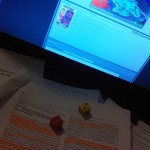 The audio commentary on “Hot Fuzz” is one of the most insightful I ever listened to. Clever, funny and honest. Everything I always wanted it to be.
The audio commentary on “Hot Fuzz” is one of the most insightful I ever listened to. Clever, funny and honest. Everything I always wanted it to be.
The last roleplaying book I held in my hands was nothing like this.
I am bringing this up, because currently I am trying to finish my bachelor’s thesis. “Trying”, since my mind tends to wander and after a 6 hour reading and writing session I really need a break.
Naturally, I am still preoccupied with my scholarly work at this point and I start dissecting and analysing every roleplaying thought crossing my mind.
I wonder about its origin, likeliness to other previous ideas, to other’s ideas and whether I should disclose my “meta-thoughts”.
As a reader I usually enjoy most works which provide me a clear frame of reference for what they want to be. “Feng Shui” for example, includes a list of other works the author used for inspiration and explicitly provides the reader with phrases and trappings of the genre.
For one, the author engages in a conversation with me about his work and minimizing the risk of misunderstandings. More importantly though, the author allows me to share his vision with increased acuity, making life as a gamer so much easier. Going back to “Feng Shui”, being disclosed the authors sources, can aid me as a gamemaster and player in everything I do: Creating plots, NPCs, PCs, layouts of noodle houses to be fought in.
In scientific writing, it is expected to source any claims one makes and to reference them in the text. This way, readers can verify information and engage in the overall scientific discussion.
Seeing how some roleplaying products already unveil most other works they were inspired by, why not take another step in this direction and fully source a game?
In its most extreme form, we could imagine a medieval fantasy book that goes to lengths in sourcing all things “medieval” in actual history books or a science fiction book making us of actual science (and interpolation thereof).
A more realistic and pragmatic approach could present itself in the form of expanded designer’s notes, in which the author acknowledges other works and lays bare the bones of his reasoning in making certain choices of the writing process.
Or maybe not. Most roleplaying hacks are probably too lazy or secretive about their arcane writings anyway. Why bother?
This week you will get to enjoy a collaborative efforts by several authors as well as an article by blut_und_glas.
English Articles:
Monday will mark the day blut_und_glas ponders The Vagaries of Fate in the grim dark future of Warhammer 40.000.
On Friday, Fear and Loathing in Los Muertos will take you on a trip into the seedy underbelly of the drug fuelled nightmare which is SLA Industries’.
German Articles:
On Tuesday blut_und_glas also meditates over The Vagaries of Fate of Warhammer 40.0000. But in German, so it reads as follows: Die Unwägbarkeiten des Schickals.
Fear and Loathing in Los Muertos original German text will be published on Thursday. It is like the “Ur-Faust” of SLA Industries related works of fiction about drugs.
Hasran
